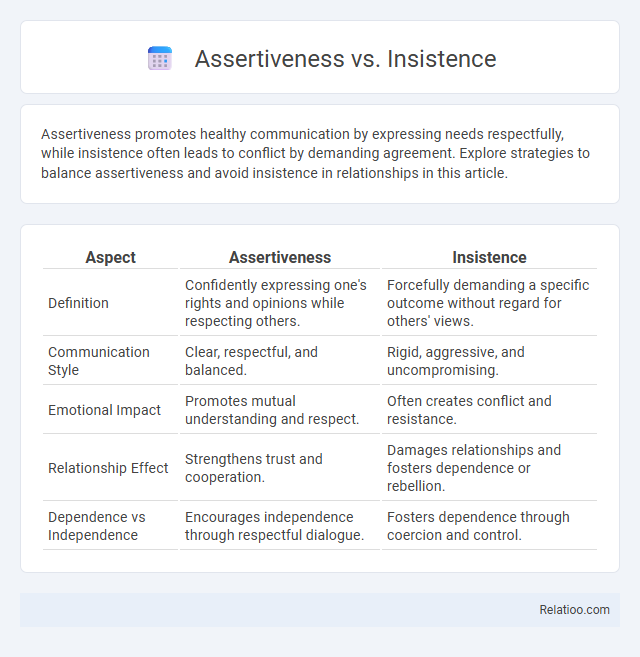Assertiveness promotes healthy communication by expressing needs respectfully, while insistence often leads to conflict by demanding agreement. Explore strategies to balance assertiveness and avoid insistence in relationships in this article.
Table of Comparison
| Aspect | Assertiveness | Insistence |
|---|---|---|
| Definition | Confidently expressing one's rights and opinions while respecting others. | Forcefully demanding a specific outcome without regard for others' views. |
| Communication Style | Clear, respectful, and balanced. | Rigid, aggressive, and uncompromising. |
| Emotional Impact | Promotes mutual understanding and respect. | Often creates conflict and resistance. |
| Relationship Effect | Strengthens trust and cooperation. | Damages relationships and fosters dependence or rebellion. |
| Dependence vs Independence | Encourages independence through respectful dialogue. | Fosters dependence through coercion and control. |
Understanding Assertiveness and Insistence: Key Definitions
Assertiveness involves confidently expressing one's thoughts and needs while respecting others, promoting clear and respectful communication. Insistence refers to firmly demanding a specific outcome or response, often without considering alternative perspectives or flexibility. Understanding these distinctions is crucial for effective interpersonal communication and conflict resolution strategies.
The Psychology Behind Assertiveness
Assertiveness involves confidently expressing thoughts and feelings while respecting others' rights, rooted in healthy self-esteem and emotional regulation. Insistence reflects a rigid demand for a specific outcome, often driven by anxiety or fear of loss, which can create interpersonal tension. Understanding the psychology behind assertiveness reveals its role in effective communication, boundary-setting, and fostering mutual respect, contrasting with the controlling nature of insistence.
What Drives Insistence?
Insistence is driven by a strong belief in the necessity or correctness of a specific outcome, often fueled by emotional investment or urgency. Unlike assertiveness, which balances confidence with respect for others' opinions, insistence compels others to accept a viewpoint without compromise. Your ability to recognize what fuels insistence can improve communication by distinguishing between firm conviction and undue pressure.
Assertiveness vs Insistence: Core Differences
Assertiveness involves confidently expressing your thoughts and feelings while respecting others' rights, promoting healthy communication and mutual understanding. Insistence, on the other hand, means demanding or refusing to accept alternatives, which can create tension or conflict by disregarding others' perspectives. You can improve professional and personal interactions by mastering assertiveness, striking a balance between standing firm and being open to collaboration.
Communication Styles: Assertive Versus Insistent
Assertive communication promotes clear, respectful expression of your needs while valuing others' perspectives, fostering collaboration and mutual understanding. Insistence involves rigidly demanding outcomes without accommodating differing viewpoints, often leading to conflict and resistance. Mastering assertiveness enhances effective dialogue by balancing confidence with empathy, whereas insistence risks alienating others through inflexibility.
Benefits of Being Assertive in Personal and Professional Life
Being assertive enhances communication by promoting clear, respectful expression of thoughts and feelings, which strengthens relationships both personally and professionally. Assertiveness fosters confidence, reduces stress, and helps resolve conflicts effectively without aggression or passivity. Maintaining this balance improves decision-making, encourages mutual respect, and supports career advancement through improved collaboration and leadership.
The Pitfalls of Excessive Insistence
Excessive insistence often leads to strained relationships and diminished collaboration, as it can be perceived as stubbornness or inflexibility. Unlike assertiveness, which asserts needs respectfully and clearly, insistence ignores others' perspectives and may escalate conflicts unnecessarily. Understanding the balance between assertiveness and insistence is crucial to maintaining effective communication without alienating colleagues or peers.
Recognizing Assertive vs Insistent Behaviors
Recognizing assertive versus insistent behaviors involves understanding the balance between confidence and aggression; assertiveness is characterized by respectful, clear communication that honors personal boundaries, while insistence often ignores others' perspectives and can pressure or coerce. Assertive individuals express their needs firmly without dismissing others, promoting constructive dialogue and mutual respect. In contrast, insistent behavior tends to escalate conflicts by prioritizing one's own agenda over collaborative solutions.
Techniques to Cultivate Healthy Assertiveness
Healthy assertiveness involves expressing thoughts and feelings confidently and respectfully, using techniques such as clear, direct communication and active listening to ensure mutual understanding. Practicing "I" statements helps maintain ownership of emotions without blaming others, which contrasts with insistence that may disregard others' perspectives. Setting boundaries firmly yet kindly supports assertiveness by promoting personal rights while fostering positive relationships.
Finding Balance: When to Assert and When to Insist
Finding balance between assertiveness and insistence involves recognizing when Your voice needs to be clear and firm without overwhelming others. Assertiveness allows you to express needs respectfully, while insistence emphasizes unwavering commitment to a point or boundary. Understanding the context and emotional landscape helps you decide when to stand firm and when to stay open for dialogue.

Infographic: Assertiveness vs Insistence
 relatioo.com
relatioo.com